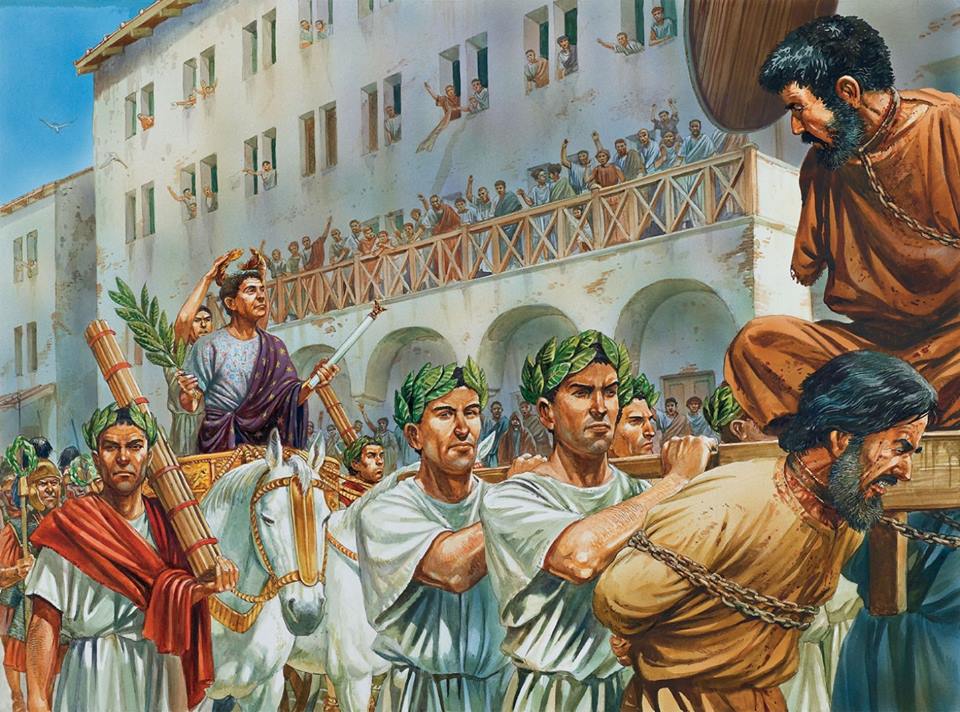Post by Gandalf on Oct 30, 2021 9:11:12 GMT -5

It was the grandest affair in recent memory, perhaps since the triumph of Scipio Aemilianus Africanus following his conquest of Africa. The procession, seven legions long - some thirty thousand veterans of the Sullan campaign - was led by none other than the Imperator Sulla. Clad in splendid triumphal regalia and the supposed cloak of Megas Alexandros himself, Sulla rode through the streets of Rome in the captured gilded chariot of Mithridates, adorned with scenes from the lives of Cyrus, Darius, Alexandros and Seleukos, and drawn by four splendid white horses from Thessalia. The captive King of Kings trailed in his wake, bound and on foot, having been washed and clothed for the occasion so that even in defeat he looked regal and magnificent. Given the place of honour alongside the Imperator was the young Marcus Lepidus, sporting the Civic Crown he had won in earlier campaigns, while Caesar, Cinna, and Regulus rode just behind them in the place traditionally reserved for the commanders and officers that had served with distinction. Following them were the soldiers, singing ribald songs and crude chants mocking everything about their commander from his complexion to his bedroom habits. The Commander took it all in good humour, drinking in the adulation of the crowds that had assembled to welcome him into Rome. As customary, the soldiers brought with them the trophies of war, a veritable hoard of wealth and treasure that had been plundered from the kingdoms of the east. From Crete, they bought reliefs and statues of Theseus and the Minotaur, the supposed crown of King Minos, and countless artworks that depicted both the Sullan victories and those of aeons past. From Asia came chariots, camels and elephants, as well as captives from the thousand tribes and nations that made up the horde of Mithridates. Gauls, Scythians, Dacians, Armenians, Cappadocians, Greeks and Persians all trundled along in the procession, symbolic of Roman triumph over the flabby and indolent eastern despots. Along with them came countless statues of gold and marble, silks and spices of the far east, and rich perfumes that hung thick and pungent in the air around their heads.
The Via Triumphalis would parade for hours around the whole city, a process exacerbated by the vast size and scope of the triumphal procession. Then, it ended as it usually did at the Temple of Jupiter Capitolinus. Two white bulls were ritually sacrificed by the hand of Sulla himself at the altar of the King of the Gods, and favourable portents announced by the Pontifex Maximus and the assembled priests. Then, Mithridates, King of Kings, was symbolically strangled before the altar of Jupiter Capitolinus, a symbol of divine justice for the man that had orchestrated the deaths of so many Romans and Italians. Following this solemn but righteous deed, it was announced that there would be seven days of feasts and games personally paid for by the Pro-Consul from the spoils of victory. Sulla would immediately depart to deposit the monies gathered by treaty into the Roman Treasury at the Temple of Saturn, a staggering sum of one-hundred thousand denarii extracted from both Pontus and the eastern cities that had so eagerly betrayed Roma. Then would the general return to his splendid Palatine house, now open to the public and generally full of guests that wish to greet and congratulate the victorious general in person. The event and celebration would last long in the memory, and for Sulla would confirm his status as the premier citizen of the Republic, twice Triumphator and Imperator. His veterans, turned loose in the city, would doubtless fund the brothels and tap houses for months to come with the plunder they had accumulated. As for their future, they would look to their commander, who now had to put forward plans for their retirement settlement to the Senate.
